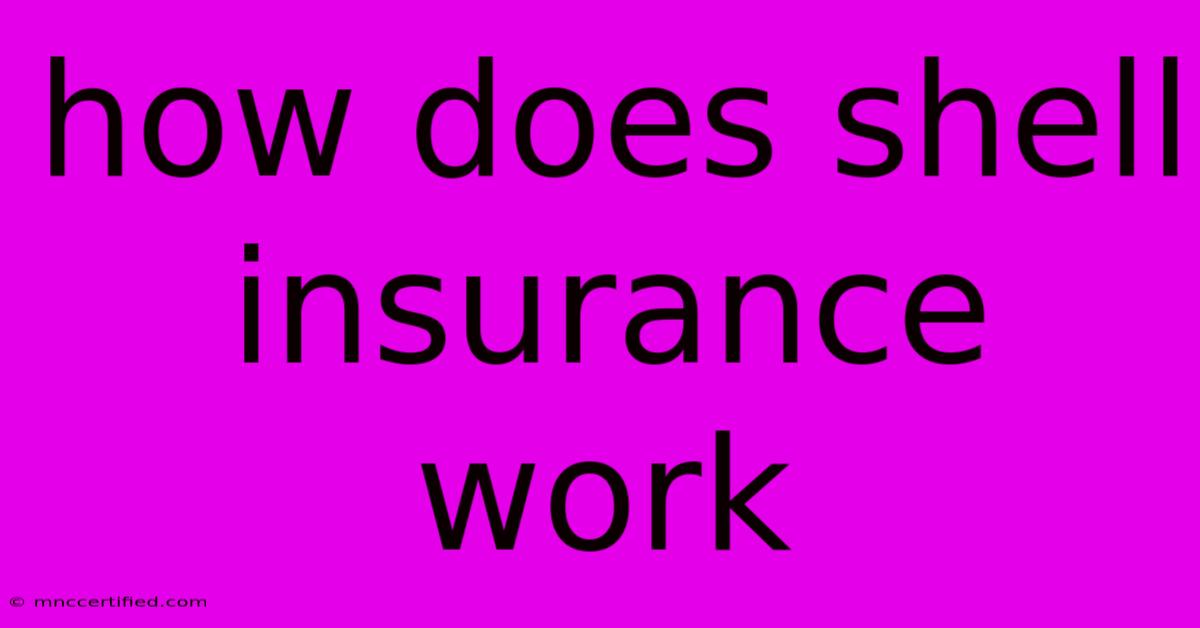How Does Shell Insurance Work

Table of Contents
How Does Shell Insurance Work? A Comprehensive Guide
Shell Insurance, while not a standalone insurance company, refers to insurance offered through Shell-branded programs or partnerships. Understanding how it works requires clarifying what type of insurance you're referring to, as Shell's involvement varies. This guide breaks down the common scenarios and explains the underlying insurance mechanisms.
Types of Shell Insurance and How They Work
Shell's involvement in insurance typically falls into these categories:
1. Insurance for Shell Employees or Contractors:
This is employer-sponsored insurance, covering workers' compensation, health insurance, and possibly other benefits. How it works: Shell, as the employer, contracts with an established insurance provider (e.g., Aetna, UnitedHealthcare) to offer various insurance plans to its employees and contractors. The specifics of the policy, coverage, and premiums are determined by Shell's agreements with the insurer and internal policies. Employees typically pay a portion of the premiums, while Shell contributes the rest. This is not something accessible to the general public.
2. Insurance for Shell Gas Stations or Retailers:
Shell-branded gas stations or retailers often have their own insurance policies to cover liability, property damage, and business interruption. How it works: Individual station owners or franchisees are responsible for securing their own insurance coverage. Shell may provide guidelines or recommendations for insurance coverage, but they are not directly providing the insurance. The policy details, premiums, and claims process are handled by the chosen insurer, not Shell.
3. Insurance Programs Offered in Partnership with Insurers:
In some regions, Shell might partner with insurance companies to offer specific insurance products, such as motor insurance or travel insurance, to their customers. How it works: Shell acts as a distributor or facilitator, marketing the insurance products offered by the partner insurance company. The actual insurance policy is issued by the partner insurer, and all claims and policy administration are handled by that insurer. Shell may receive a commission for referring customers.
4. Warranty and Service Contracts:
Shell's products, like motor oil or lubricants, may come with warranties or service contracts. These aren't strictly insurance, but they offer a degree of protection. How it works: If a product fails to meet specified standards within the warranty period, Shell or an authorized service center may provide a repair, replacement, or refund. These are covered by Shell's internal warranty policies, not external insurance providers. They are more akin to manufacturer guarantees than insurance policies.
Key Considerations When Dealing with Shell-Related Insurance
- Identify the Insurer: Always confirm which company is actually providing the insurance. It's not always Shell.
- Review Policy Documents Carefully: Understand the terms, conditions, coverage limits, and exclusions.
- Know Your Rights: Familiarize yourself with your rights as a policyholder, particularly regarding claims procedures.
- Contact the Correct Party: For claims or policy inquiries, contact the insurance company directly, not Shell's general customer service line.
Finding the Right Information:
To understand the insurance specifics you're looking for, be precise in your search terms. Instead of searching for “Shell insurance,” try “Shell employee insurance,” “insurance for Shell gas stations,” or “Shell partnered insurance programs” for more targeted results.
This information aims to provide a comprehensive overview. For specific questions regarding a particular Shell insurance program, always consult the relevant documentation or contact the actual insurance provider.

Thank you for visiting our website wich cover about How Does Shell Insurance Work. We hope the information provided has been useful to you. Feel free to contact us if you have any questions or need further assistance. See you next time and dont miss to bookmark.
Featured Posts
-
Zoe Ball Suffers Headaches From Jaw Issue
Nov 29, 2024
-
Is Starbucks Open Thanksgiving
Nov 29, 2024
-
Mc Donalds Thanksgiving Hours Open Or Closed
Nov 29, 2024
-
Acceptance Insurance Lee Road
Nov 29, 2024
-
Tottenham Roma Europa League Live Match Stream
Nov 29, 2024